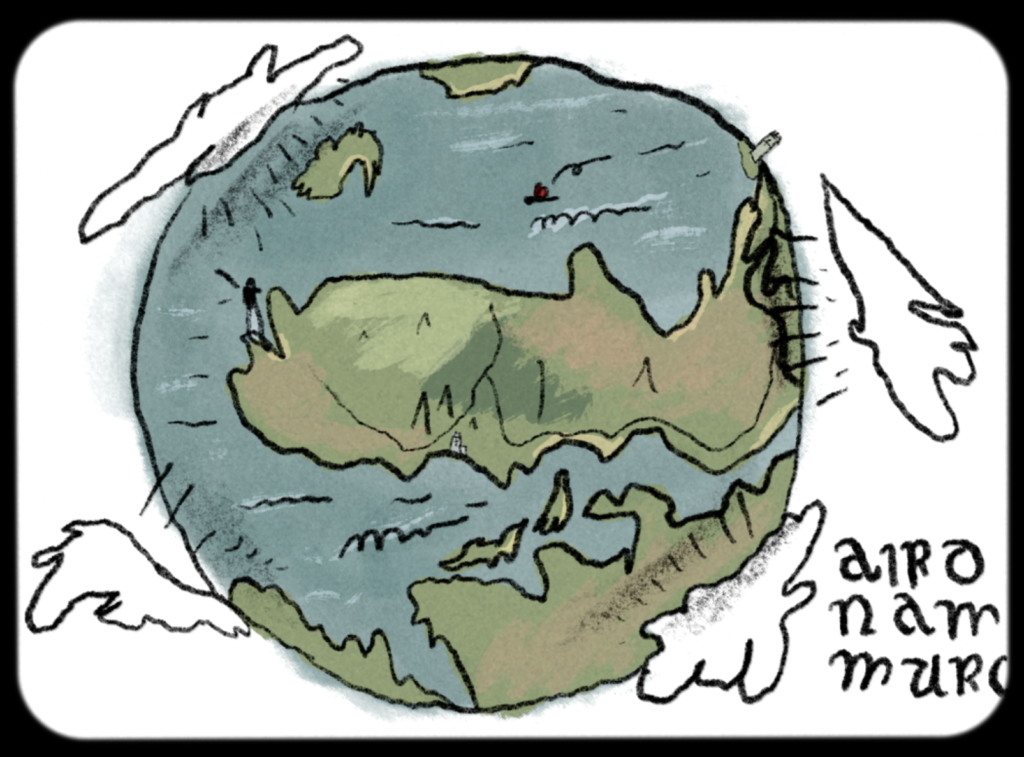Eerily sparse but far from still. Hauntingly silent, save the rustle of the sea. The far-flung Ardnamurchan landscape whistles through archived footage and nifty animations in Hannah Hunter’s Their Accounts. You might half anticipate the unease of the seemingly vacant scenes to be punctured by the frustrated Thatcher-era words of The Specials – “This town, is coming like a ghost town… Do you remember the good old days before the ghost town?” This sentiment is still shared with the young people from this corner of the West Highlands of Scotland. Their home, once thriving, their community, once self-sustaining, has been incrementally coerced and manipulated for commercial gain. Hannah Hunter’s short film laments a new wave of rural clearance, depopulation and the gradual bleeding out of remote communities.

Initially an ode to their native landscape, Their Accounts explores the past, present and future of Ardnamurchan through the voices of its young people. Filled to the brim with reminiscence about their rural adolescence, interviewees reflect on the magic, peace and freedom of their community. However, increased incentives for serving the tourist industry have poisoned the waters that run through their haven, and this idyllic version of their home that they so much cherish has mutated into a great burden. On their shoulders, they carry the future of Ardnamurchan. A documentary film without a mediator permits an authentic truth to be told of the expectation that looms sinisterly over this generation of its population. This expectation forces them to choose between leaving behind everything they know in pursuit of opportunities, but surrendering their community to commercialisation, or staying behind to preserve it, to the detriment of their livelihoods. Their internal strife becomes more acute throughout the film, how do you choose between your history and your future?
The gravity of this teetering fate is explored solely through faceless anecdotes. Their dulcet (and somewhat chirpy) tones present a stark contrast to the sombre note of their predicament. It is difficult to fathom their composure, perhaps their anonymity masks their frustration. As the omission of an objective narrator obscures any preconceptions, you are left with little else than the sincere contemplations of the people. They plead to be acknowledged, desperate to be listened to. You hear their message loud and clear: do not let us be erased, ironically, this is the point of the faceless voices. They are afraid of history repeating itself.
Viscerally aware of the past, the Highlands are no stranger to the erasure of its people and depopulation of its land. A century after the ethnic cleansing and suppression of the Gaelic language and culture, the Highland Clearances saw further decimation of the area. Wealthy landowners pillaged the land to make room for something far more lucrative than the people: sheep. People, history, culture, language and strong communities were utterly destroyed for profit. Today, communities like those of Ardnarmurchan are vigilant as they look on at the shadow of this violence. Yes, there is no more burning and pillaging, but wealthy landowners and entitled incomers still swallow whole what is left of picture-perfect pockets like these – again, for commercial gain. Replace the sheep with tourists and you’ll get a whiff of the recurring pattern putting Highlanders on edge.

Hunter has crafted a powerful homage to Ardnamurchan not only with the impact of honest lamentations but also through spectacular moving images of the so far unblemished landscape. You are invited into the marvel of this place, allowed to view a sliver of its magnificence. Deft shots of both old footage and new, sidled neatly beside each other, beauty spots from all along this peninsula preserved, the authenticity so miraculously upheld, the archived and the modern hardly distinguishable from one another. You wonder how it could be so unchanged in all this time. Interviewees bring to light the cultural impact that invasive tourism has on places like these. How it is indeed beginning to blemish. The houses empty. The small businesses neglected. The people exploited for their oral histories and then left dangling as the waves of holidaymakers recede back over the sea. There is a harrowing sense that Ardnamurchan is being hollowed out, and young voices fear that their history is being watered down for commercial viability to the point of total destruction..
Where does this leave young people in small communities? Their home is at risk of becoming a cultural wasteland, eroded in order to survive the 21st century. It leaves them with no other choice than to leave it behind, surrendering it to further clearance. Either way, their home is slipping away – a frightening idea, and unfortunately not a new reality. If your past is corroded and your future not viewed as lucrative enough, you are squeezed out. Their Accounts embodies a fragment of the devastation created by forced displacement.
Eleanor Beadle